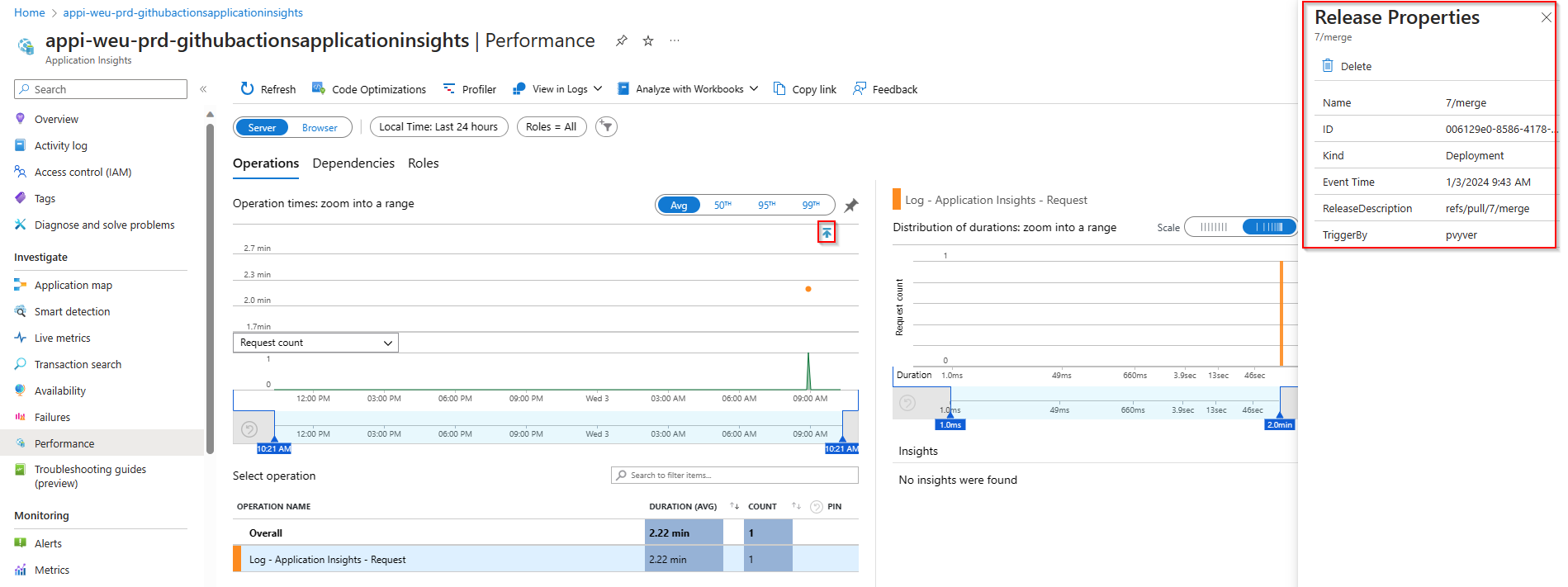Github Actions monitoring with Application Insights
- Introduction
- Ingest Application Insights Request Telemetry data
- Ingest Application Insights Release Annotation
Introduction
I love working with Github Actions for Continuous Integration and Deployment.
By default you get emails regarding failed workflows for Github monitoring.
To get more insights in the performance and success of workflows, you can leverage Application Insights to log performance, failures and release annotations.

To achieve this, I use:
- The Azure SDK for .NET to ingest Request Telemetry data
- The Application insights Rest API together with AZ CLI to ingest release annotations.
Ingest Application Insights Request Telemetry data
In this example I’m logging a successful request (ResponseCode = 200) to Application Insights.
The PowerShell script logs the duration of the request, success and some custom properties (ActionRunURL, MyTestProperty1, MyTestProperty2)
Github Action
The Github Action consist of the following:
- Workflow trigger:
- workflow dispatch trigger to trigger the workflow manually.
- Environment variable:
APPLICATIONINSIGHTS_INSTRUMENTATIONKEY: Containing the Application Insights Instrumentation keye
- Jobs:
application-insights-log-request- Steps:
set-startdatetime-var: gets the current time and sets it to an environment variablelogin-azure: As explained in Use GitHub Actions to connect to Azureapplication-insights-log-request: runs a PowerShell script to log the request to Application Insights
- Steps:
Here’s the full content of the Github Action:
name: Log - Application Insights - Request
on:
workflow_dispatch
env:
APPLICATIONINSIGHTS_INSTRUMENTATIONKEY: "xxxxxxxx-xxxx-xxxx-xxxx-xxxxxxxxxxxx"
jobs:
application-insights-log-request:
runs-on: ubuntu-latest
steps:
- name: set-startdatetime-var
run: |
START_DATETIME=$(date '+%d/%m/%Y %H:%M:%S')
echo $START_DATETIME
echo "START_DATETIME=$START_DATETIME" >> $GITHUB_ENV
- name: login-azure
uses: azure/login@v1
with:
creds: '{"clientId":"$","clientSecret":"$","subscriptionId": "$","tenantId":"$"}'
enable-AzPSSession: true
- name: application-insights-log-request
shell: pwsh
run: |
# set variables
$InstrumentationKey = $env:APPLICATIONINSIGHTS_INSTRUMENTATIONKEY
$Name = $env:GITHUB_WORKFLOW
$Started = $env:START_DATETIME
$Success = $true # set to false for failed
$ResponseCode = 200 # set to 500 for failed
$startedDateTime = [datetime]::ParseExact($Started, "dd/MM/yyyy HH:mm:ss", $Null)
[System.TimeSpan]$Duration = New-TimeSpan -Start $startedDateTime -End (Get-Date)
$StartedDateTimeOffset = [System.DateTimeOffset]$startedDateTime
# setup telemetry client
$telemetryClient = New-Object -TypeName Microsoft.ApplicationInsights.TelemetryClient
$telemetryClient.InstrumentationKey = $InstrumentationKey
# initialize context information
$TelemetryClient.Context.User.Id = "$($env:GITHUB_ACTOR)"
$telemetryClient.Context.Operation.Name = $Name
# set telemetry context
$TelemetryClient.Context.Session.Id = "$($env:GITHUB_REPOSITORY)/$($env:GITHUB_WORKFLOW)/$($env:GITHUB_RUN_ID)/$($env:GITHUB_JOB)"
$telemetryClient.Context.Operation.Id = "$($env:GITHUB_REPOSITORY)/$($env:GITHUB_WORKFLOW)/$($env:GITHUB_RUN_ID)/$($env:GITHUB_JOB)"
Write-Host "SessionId: $($TelemetryClient.Context.Session.Id)"
Write-Host "User Id: $($TelemetryClient.Context.User.Id)"
Write-Host "Operation Id: $($TelemetryClient.Context.Operation.Id)"
Write-Host "Operation Name: $($TelemetryClient.Context.Operation.Name)"
# setup request telemetry information
$request = New-Object -TypeName Microsoft.ApplicationInsights.DataContracts.RequestTelemetry
$request.Name = $Name
$request.StartTime = $StartedDateTimeOffset
$request.Duration = $Duration
$request.Success = $Success
$request.ResponseCode = $ResponseCode
Write-Host "StartTime: $StartedDateTimeOffset"
Write-Host "Duration: $Duration"
Write-Host "Success: $Success"
Write-Host "ResponseCode: $ResponseCode"
# set actionurl
$ActionRunURL = "$($env:GITHUB_SERVER_URL)/$($env:GITHUB_REPOSITORY)/actions/runs/$($env:GITHUB_RUN_ID)"
Write-Host "ActionRunURL : $ActionRunURL"
# set properties
[HashTable]$Properties = @{}
$properties["ActionRunURL"] = "$ActionRunURL"
$properties["MyTestProperty1"] = "Test 1"
$properties["MyTestProperty2"] = "Test 2"
# copy properties to request
$properties.Keys | ForEach-Object { $request.Properties[$_] = $Properties[$_] }
# track the request
$telemetryClient.TrackRequest($request)
# flush
$telemetryClient.Flush()
PowerShell script
Here’s the content of the inline PowerShell script:
# set variables
$InstrumentationKey = $env:APPLICATIONINSIGHTS_INSTRUMENTATIONKEY
$Name = $env:GITHUB_WORKFLOW
$Started = $env:START_DATETIME
$Success = $true # set to false for failed
$ResponseCode = 200 # set to 500 for failed
$startedDateTime = [datetime]::ParseExact($Started, "dd/MM/yyyy HH:mm:ss", $Null)
[System.TimeSpan]$Duration = New-TimeSpan -Start $startedDateTime -End (Get-Date)
$StartedDateTimeOffset = [System.DateTimeOffset]$startedDateTime
# setup telemetry client
$telemetryClient = New-Object -TypeName Microsoft.ApplicationInsights.TelemetryClient
$telemetryClient.InstrumentationKey = $InstrumentationKey
# initialize context information
$TelemetryClient.Context.User.Id = "$($env:GITHUB_ACTOR)"
$telemetryClient.Context.Operation.Name = $Name
# set telemetry context
$TelemetryClient.Context.Session.Id = "$($env:GITHUB_REPOSITORY)/$($env:GITHUB_WORKFLOW)/$($env:GITHUB_RUN_ID)/$($env:GITHUB_JOB)"
$telemetryClient.Context.Operation.Id = "$($env:GITHUB_REPOSITORY)/$($env:GITHUB_WORKFLOW)/$($env:GITHUB_RUN_ID)/$($env:GITHUB_JOB)"
Write-Host "SessionId: $($TelemetryClient.Context.Session.Id)"
Write-Host "User Id: $($TelemetryClient.Context.User.Id)"
Write-Host "Operation Id: $($TelemetryClient.Context.Operation.Id)"
Write-Host "Operation Name: $($TelemetryClient.Context.Operation.Name)"
# setup request telemetry information
$request = New-Object -TypeName Microsoft.ApplicationInsights.DataContracts.RequestTelemetry
$request.Name = $Name
$request.StartTime = $StartedDateTimeOffset
$request.Duration = $Duration
$request.Success = $Success
$request.ResponseCode = $ResponseCode
Write-Host "StartTime: $StartedDateTimeOffset"
Write-Host "Duration: $Duration"
Write-Host "Success: $Success"
Write-Host "ResponseCode: $ResponseCode"
# set actionurl
$ActionRunURL = "$($env:GITHUB_SERVER_URL)/$($env:GITHUB_REPOSITORY)/actions/runs/$($env:GITHUB_RUN_ID)"
Write-Host "ActionRunURL : $ActionRunURL"
# set properties
[HashTable]$Properties = @{}
$properties["ActionRunURL"] = "$ActionRunURL"
$properties["MyTestProperty1"] = "Test 1"
$properties["MyTestProperty2"] = "Test 2"
# copy properties to request
$properties.Keys | ForEach-Object { $request.Properties[$_] = $Properties[$_] }
# track the request
$telemetryClient.TrackRequest($request)
# flush
$telemetryClient.Flush()
Result
When the workflow ran, the following result is shown:

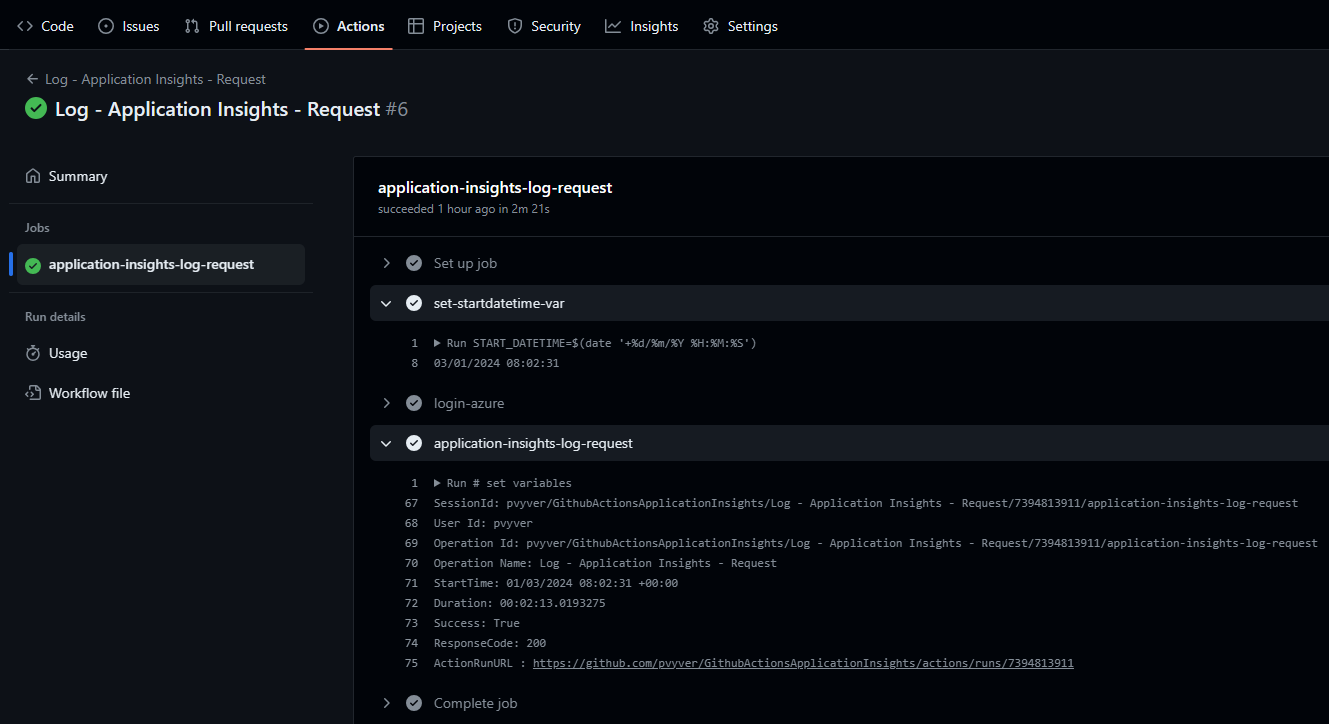
In the Application Insights instance, the following appears:
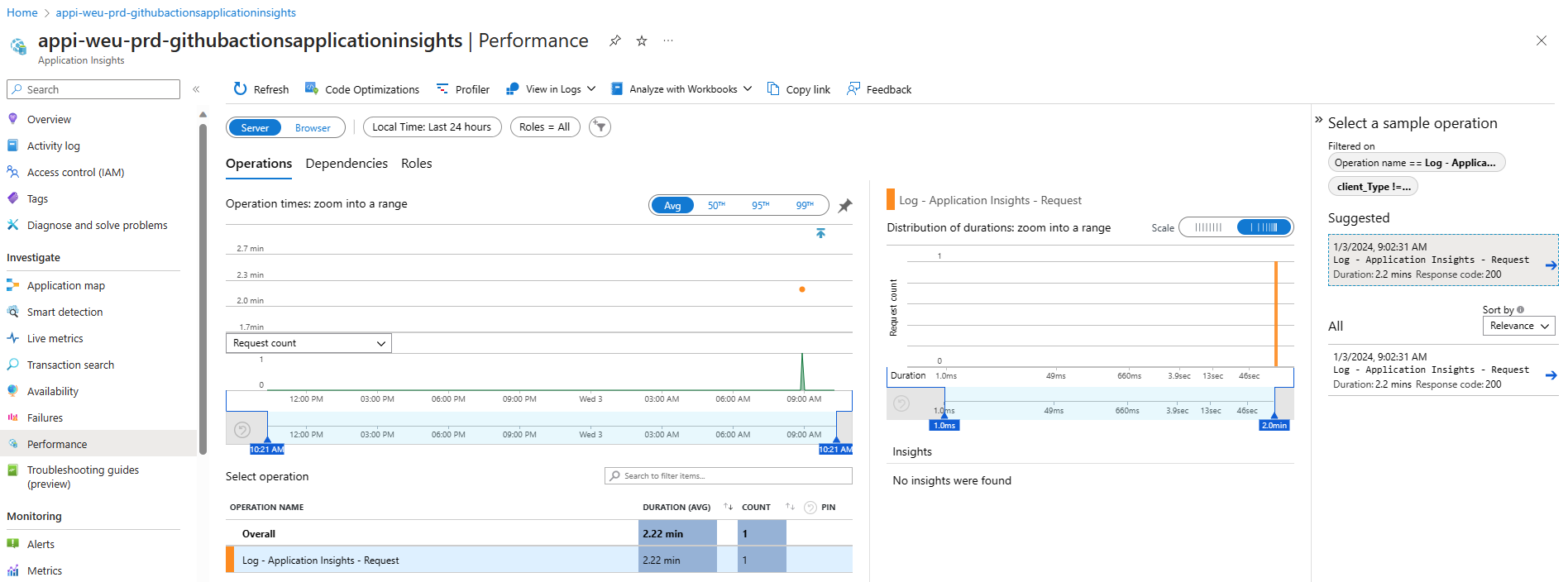
When clicking on the request, the following details are shown:
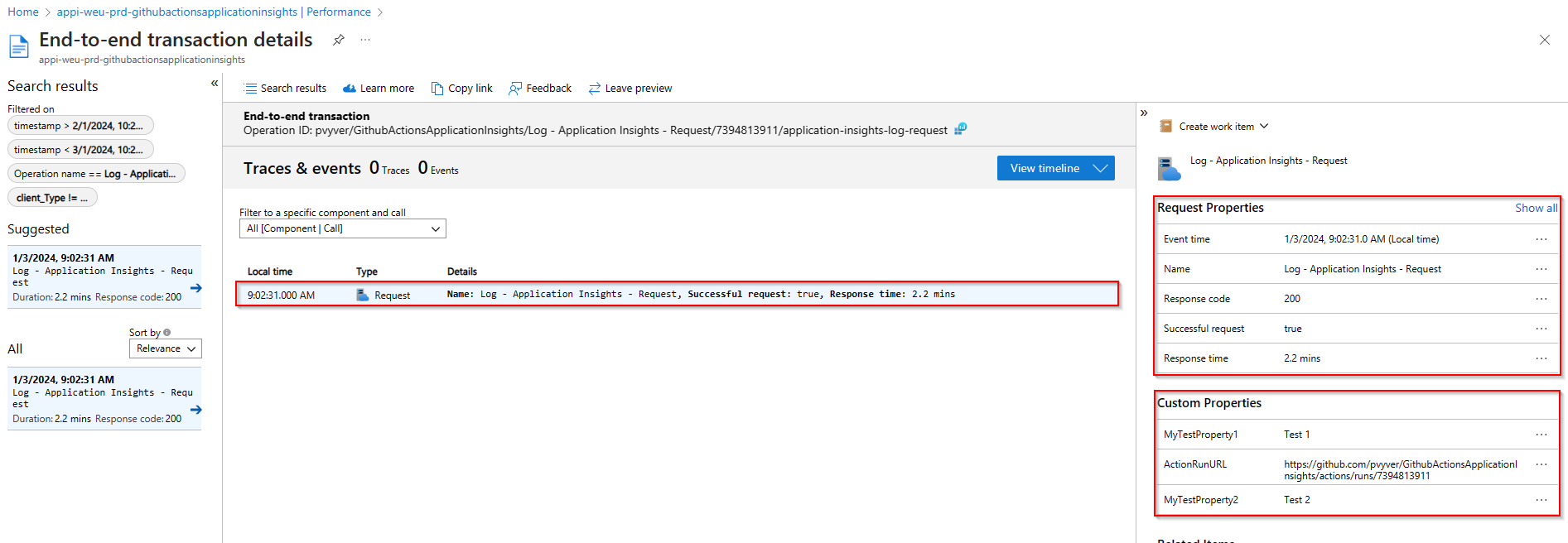
Ingest Application Insights Release Annotation
In this example I’m logging a release annotation for a new release with some custom properties from the default Github environment variables.
The trigger of the request is a
Github Action
The Github Action consist of the following:
- Workflow trigger:
- pull request on the
mainbranch of the repository.
- pull request on the
- Environment variable:
APPLICATION_INSIGHTS_RESOURCE_ID: Containing the Application Insights Resource Id
- Jobs:
create-applicationinsightsannotation- Steps:
set-startdatetime-var: gets the current time and sets it to an environment variablelogin-azure: As explained in Use GitHub Actions to connect to Azurecreate-applicationinsightsannotation: runs a PowerShell script to ingest an annotation in application insights
- Steps:
Here’s the full content of the Github Action:
name: Log - Application Insights - Annotation
on:
pull_request:
branches:
- main
env:
APPLICATION_INSIGHTS_RESOURCE_ID: "/subscriptions/xxxxxxxx-xxxx-xxxx-xxxx-xxxxxxxxxxxx/resourceGroups/rg-weu-prd-githubactionsapplicationinsights/providers/microsoft.insights/components/appi-weu-prd-githubactionsapplicationinsights"
jobs:
create-applicationinsightsannotation:
runs-on: ubuntu-latest
steps:
- name: login-azure
uses: azure/login@v1
with:
creds: '{"clientId":"$","clientSecret":"$","subscriptionId": "$","tenantId":"$"}'
enable-AzPSSession: true
- name: set-startdatetime-var
run: |
START_DATETIME=$(date '+%d/%m/%Y %H:%M:%S')
echo $START_DATETIME
echo "START_DATETIME=$START_DATETIME" >> $GITHUB_ENV
- name: create-applicationinsightsannotation
id: create-applicationinsightsannotation
uses: azure/powershell@v1
with:
inlineScript: |
# set annotation properties
$annotationProperties = @{"ReleaseDescription" = "$env:GITHUB_REF"; "TriggerBy" = "$env:GITHUB_ACTOR" }
$annotationPropertiesJson = ConvertTo-Json $annotationProperties -Compress
# build annotation
$annotation = @{
Id = [GUID]::NewGuid();
AnnotationName = "$($env:GITHUB_REF_NAME)";
EventTime = (Get-Date).ToUniversalTime().GetDateTimeFormats("s")[0];
Category = "Deployment";
Properties = $annotationPropertiesJson
}
# set body
$body = (ConvertTo-Json $annotation -Compress) -replace '(\\+)"', '$1$1"' -replace "`"", "`"`""
# submit annotation
az rest --method put --uri "$($env:APPLICATION_INSIGHTS_RESOURCE_ID)/Annotations?api-version=2015-05-01" --headers "Content-Type=application/json" --body "$($body) "
azPSVersion: "11.1.0"
errorActionPreference: stop
PowerShell script
# set annotation properties
$annotationProperties = @{"ReleaseDescription" = "$env:GITHUB_REF"; "TriggerBy" = "$env:GITHUB_ACTOR" }
$annotationPropertiesJson = ConvertTo-Json $annotationProperties -Compress
# build annotation
$annotation = @{
Id = [GUID]::NewGuid();
AnnotationName = "$($env:GITHUB_REF_NAME)";
EventTime = (Get-Date).ToUniversalTime().GetDateTimeFormats("s")[0];
Category = "Deployment";
Properties = $annotationPropertiesJson
}
# set body
$body = (ConvertTo-Json $annotation -Compress) -replace '(\\+)"', '$1$1"' -replace "`"", "`"`""
# submit annotation
az rest --method put --uri "$($env:APPLICATION_INSIGHTS_RESOURCE_ID)/Annotations?api-version=2015-05-01" --headers "Content-Type=application/json" --body "$($body) "
Result
When the workflow ran, the following result is shown:

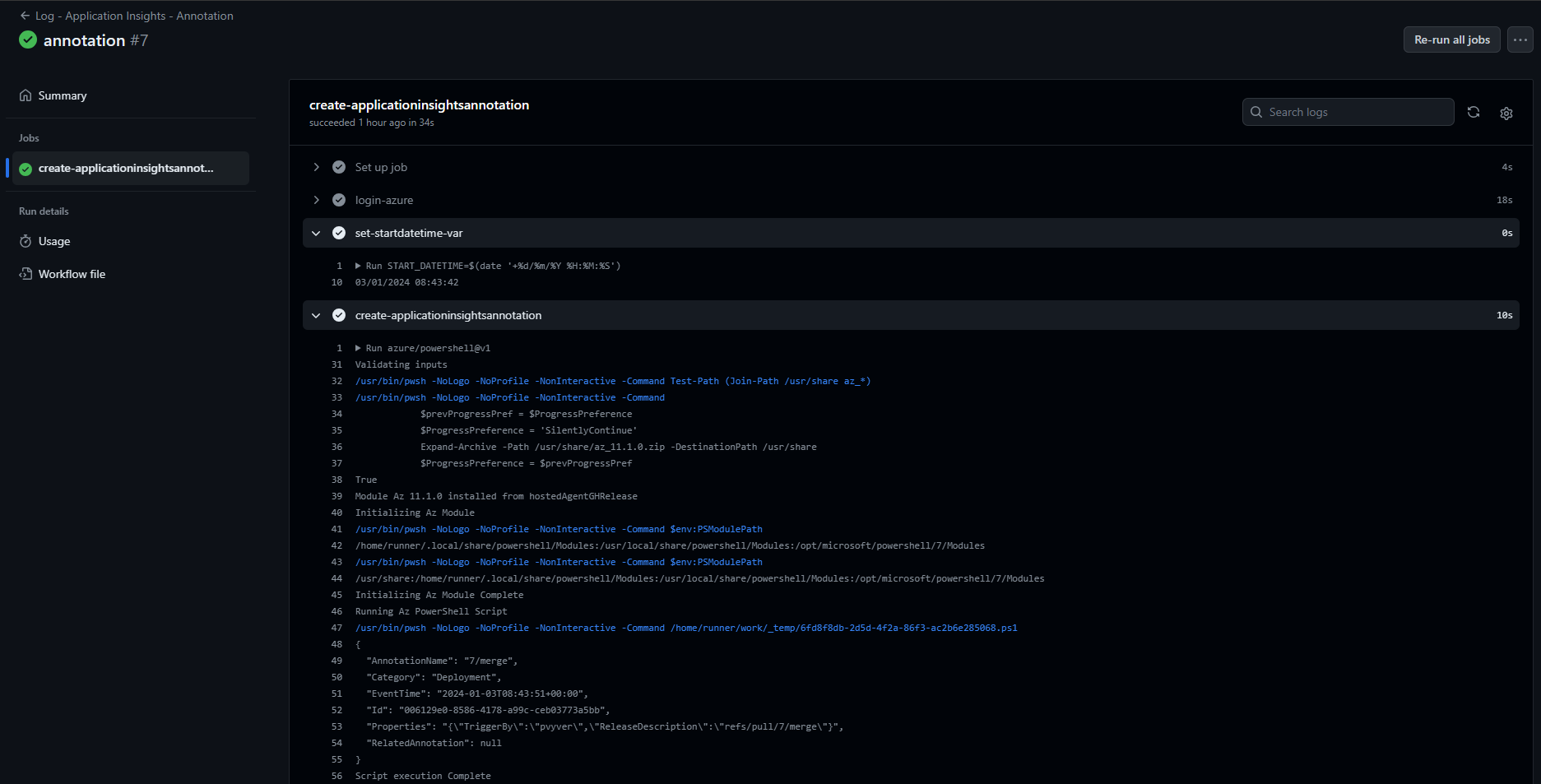
As result, the release annotation is shown in the graph with some custom properties:
